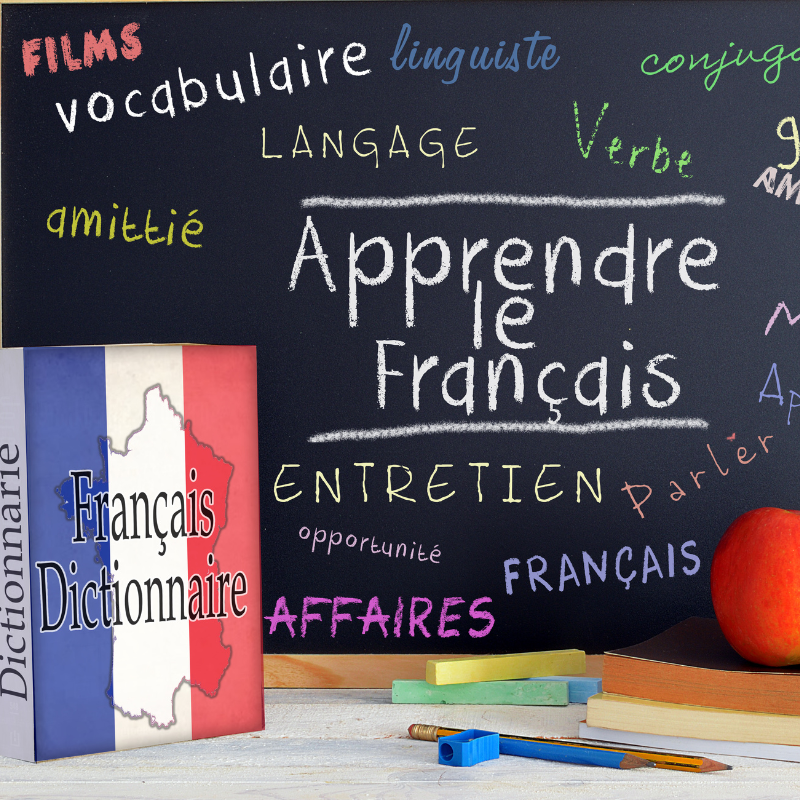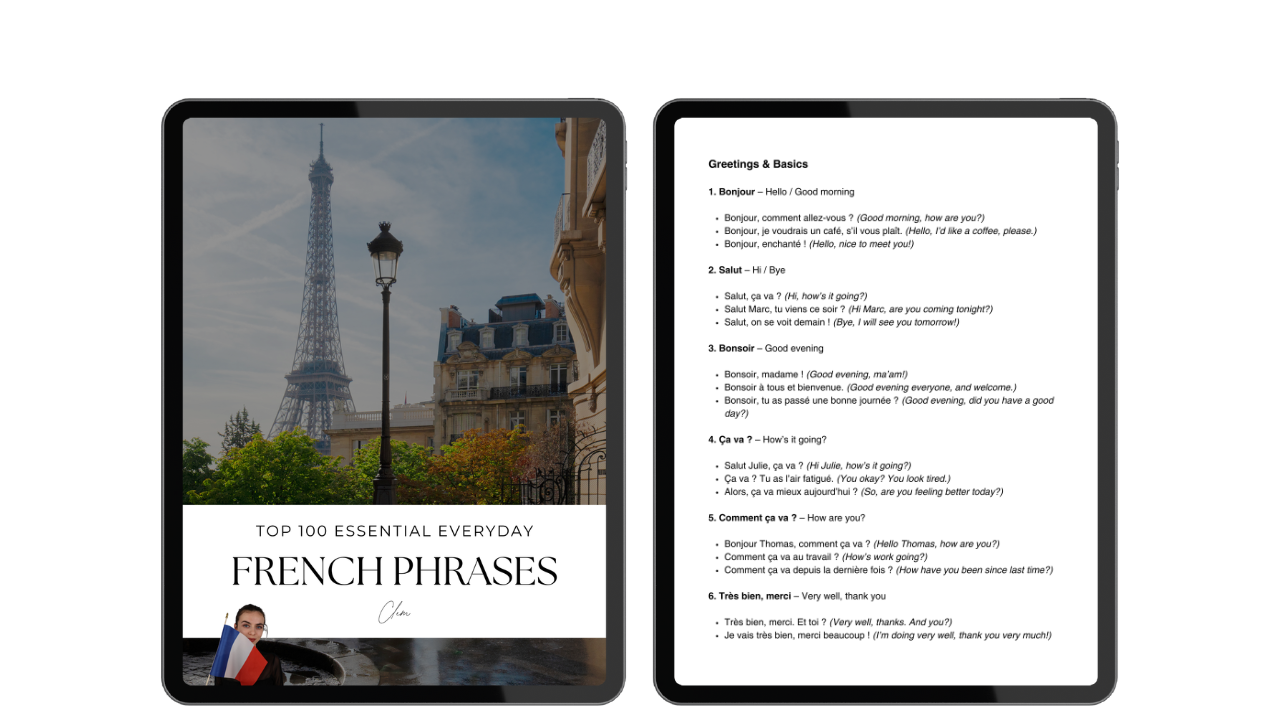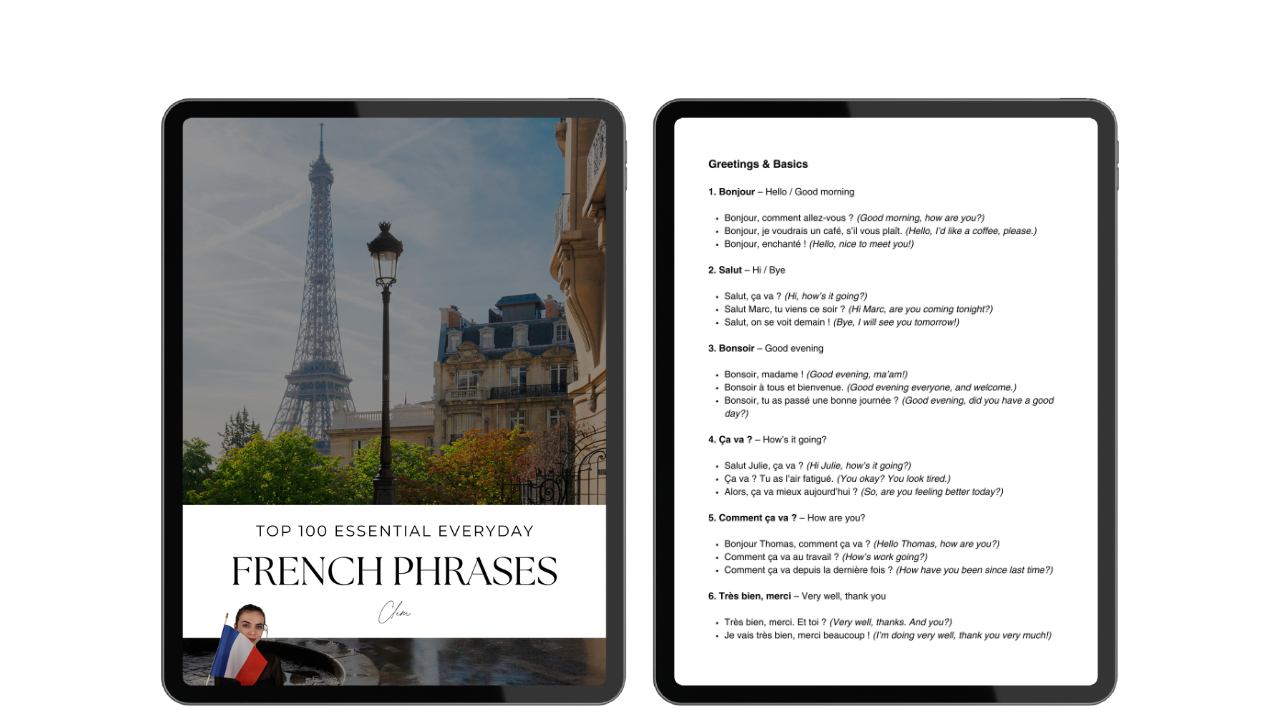
Common Beginner French Mistakes and How to Avoid Them
Jun 03, 2025Learning French is exciting, but let’s be honest, it can also feel a little tricky at first. Maybe you’ve misgendered a noun, tripped over tricky pronunciation, or asked for a fish when you meant to ask for a fork (it happens!). These little slip-ups are totally normal, and every beginner makes them.
If you’re just starting out with French or you’ve been learning for a while and still feel unsure about some basics, this guide is for you. When you know which common mistakes to look out for, you can save time, frustration, and a few awkward moments.
The good news? Most beginner mistakes are super common and super fixable. And once you know what they are, you’ll be able to move forward with more confidence and clarity.
In this post, we’ll walk through the most frequent mistakes like grammar mix-ups, pronunciation traps, and vocabulary slip-ups, and show you exactly how to avoid them. Plus, we’ll share how learning with Clémence can make the whole process easier, faster, and, more importantly, fun!
1. Confusing “tu” and “vous”
French has two ways to say “you”: “tu” (informal) and “vous” (formal or plural). As a beginner, you can easily mix them up, making you sound overly familiar or too distant. Use “tu” with friends, kids, and people your age in casual settings. Use “vous” for strangers, elders, and professional situations.
Pro tip: When in doubt, go with “vous.” It’s always safer to start formally and shift to “tu” if invited.
2. Forgetting to make French nouns and adjectives agree
In French, adjectives must match the gender and number of the noun. For example, un chien noir (a black dog – masculine), but une robe noire (a black dress – feminine). This agreement rule is easy to overlook at first.
Pro tip: After learning a new noun, always memorize it with its article (le/la). It makes gender agreement much easier to remember later.
3. Mispronouncing nasal sounds
French language nasal sounds like on, en, an, and un can be tricky. Unlike English words, the sound comes through the nose, not the mouth. Words like pain (bread) or bon (good) aren’t said the way they look to English speakers.
Pro tip: Practice with audio. Don’t just read the word, listen and repeat. Clémence’s French lessons are packed with native pronunciation guides to help you get it right from the start.
4. Literal translations from English
Trying to translate English directly into French often leads to odd or incorrect phrases. For instance, “I miss you” becomes Tu me manques (literally “you are missing from me”).
Pro tip: French language sentence structure sometimes flips the subject and object compared to English. Don’t worry, it becomes intuitive as you practice the new language.
5. Misusing “C’est” and “Il/Elle est”
Both mean “it is,” but they’re not interchangeable. Use “C’est” before a noun (e.g. C’est un médecin – He’s a doctor), and “Il/Elle est” before an adjective (e.g. Elle est intelligente – She is smart).
Pro tip: A quick rule of thumb is that if there’s an article or possessive word (un, une, le, ma…), go with “C’est.”
6. Ignoring silent letters

Many French words end with letters that aren’t pronounced, like the “t” in chat or the “s” in vous. Saying them aloud can give you away as a beginner.
Pro tip: Read with your ears, not your eyes. Listen to native French speakers and mimic their rhythm. Over time, you’ll naturally absorb the silent-letter patterns.
7. Overusing “Très”
Non-native speakers love using “très” (very) in front of everything like “très bon”, “très fatigue”, etc. While it works, French speakers often prefer stronger, more natural words like super, vraiment, or just the adjective on its own.
Pro tip: Try swapping “très” with more expressive vocabulary. You’ll sound more authentic and less robotic. It is one of the most common mistakes to avoid in French.
8. Skipping liaisons
Liaisons are those sneaky little links between words, like in vous avez (pronounced “voo-zavez”). If you ignore them, it can make your speech sound choppy or awkward.
Pro tip: Learn which liaisons are mandatory, optional, or forbidden to improve your language skills. Listening to full sentences helps more than isolated words. Another reason Clémence’s method focuses on real-life conversations!
Also read: How to Start a Conversation with Anyone in French.
9. Using the wrong verb for “to know”
French has two verbs for “to know”:
- Savoir, and
- Connaître
Savoir is for facts or how to do something. Connaître is for being familiar with someone or something.
Pro tip: Think of savoir as “know-how” and connaître as “being acquainted with.” If you “know” a song, person, or place, use connaître.
10. Forgetting articles before nouns
Unlike English, you can’t drop articles in French. Instead of saying “I like chocolate,” you must say J’aime le chocolat. It feels weird at first, but it becomes natural with practice.
Pro tip: Always include le, la, les (the) or un, une, des (a/an/some) in your phrases—even when you’re just thinking in French.
Want to see how easy it is to learn French with Clémence? Take a FREE sample lesson today and experience the difference for yourself. With friendly guidance, clear explanations, and a focus on real-life French, you’ll be surprised how fast your confidence grows!
11. Mixing up masculine and feminine French words
It’s tempting to assume all nouns ending in “-e” are feminine nouns or “-on” are masculine, but French is full of exceptions!
Saying le voiture instead of la voiture might seem minor, but it’s noticeable.
Pro tip: Use color-coded flashcards (blue for masculine, red for feminine nouns) or always learn nouns with their article (e.g. la maison, not just maison). Clémence’s course builds this habit early, so it sticks.
12. Using “Être” instead of “Avoir” for age
In French, age is expressed with the verb "avoir" (to have), not "être" (to be). So instead of saying Je suis 20 ans, the correct version is J’ai 20 ans (literally, “I have 20 years”).
Pro tip: Memorize a few everyday expressions where the French language uses “avoir” and English uses “to be.” Like avoir faim (to be hungry), avoir peur (to be afraid), etc. They pop up all the time!
13. Translating “I’m good” incorrectly
Many learners say Je suis bien when they mean “I’m good,” but that sounds off. In French, emotional or physical well-being is expressed with ça va or Je vais bien.
Pro tip: Think of bien as an adverb and bon as an adjective. And remember, Je suis bien might mean “I’m morally good”—not what you want at a dinner party.
14. Misplacing object pronouns
Object pronouns like le, la, lui, and leur often trip up beginners. English usually puts them after the verb, but French puts them before: Je le vois (I see him/it), not Je vois le.
Pro tip: Practice speaking short, simple sentences using object pronouns in daily conversation. Clémence offers plenty of practice drills to help you master this smoothly.
15. Neglecting “ne” in negatives
Many learners drop the “ne” and only say pas, like Je sais pas instead of Je ne sais pas. While this is common in casual speech, learning the full structure first is better.
Pro tip: Learn it the right way, then loosen up later. Once you’ve nailed the grammar, you can speak more casually without bad habits and avoid French language mistakes.
16. Misusing “Parce que” and “Puisque”
Both can mean “because,” but they’re not identical. Use parce que to explain why something happened. Use puisque when the reason is already known or obvious.
Pro tip: In most beginner conversations, parce que will work just fine. Don’t stress too much, just know there’s a subtle difference for later.
17. Forgetting verb conjugation patterns
French verbs change depending on who’s doing the action. Beginners often forget to conjugate properly, saying je aller instead of je vais.
Pro tip: Focus on mastering the most common verbs first—être, avoir, aller, faire. Once these become second nature, everything else builds more easily. Clémence’s French lessons teach them in context, so you’re not memorizing in isolation.
18. Confusing “Bon” and “Bien”
Both relate to “good,” but bon is an adjective, and bien is an adverb. So it’s un bon gâteau (a good cake), but il chante bien (he sings well).
Pro tip: Try replacing “bien” with “well” and “bon” with “good” in your head. If “well” makes sense, use bien.
19. Misunderstanding “Depuis”
Many English speakers confuse depuis (since/for) with pendant (during). But depuis is used with the present tense for actions that started in the past and continue now: Je vis ici depuis 2015.
Pro tip: If you’re still doing the action, use depuis. If it’s over, use pendant or il y a.
20. Ignoring accent marks
Accent marks in French aren’t decorative. They completely change the meaning. Ou means “or,” while où means “where.” A (has) and à (to) are different words. Forgetting French accents can confuse both you and your reader/listener.
Pro tip: Practice typing with accents on your phone or keyboard. Or use a language learning tool (like Clémence’s resources!) that helps build this habit.
21. Trying to be perfect from day one
Perfectionism is a major learning blocker. If you’re too scared to speak until you have no French grammar errors, you’ll delay fluency. Making common French mistakes is how you learn.
Pro tip: Embrace progress over perfection. Speak, laugh at your typical French beginner errors, and keep going. Clémence creates a safe, encouraging space to practice without fear.
You may also like: How Long Does It Take to Become Fluent in French?
Takeaway: Avoid some common beginner French mistakes to improve your learning game
Learning French isn’t about being perfect; it’s about connecting, exploring, and enjoying the process. Every mistake you make is actually a sign that you’re trying, learning, and improving. The key is to keep showing up and practicing.
Want to see how easy it is to learn French with Clémence? Take a FREE sample lesson today and experience the difference a structured, friendly approach can make. Common mistakes are normal. Giving up isn’t. Keep going, you’ve got this!
FAQs
Here are the answers to a few frequently asked questions that you might be interested in:
Which proficiency level is considered beginner in French?
Beginner French typically refers to A1 and A2 levels of the CEFR (Common European Framework of Reference for Languages). At this stage, you’re learning basic vocabulary, common verbs, and how to form simple sentences about yourself, your surroundings, and daily activities.
You might understand slow, clear French but still struggle with speaking French confidently or grasping grammar. A1 is very basic; A2 means you can handle everyday situations. Clémence’s beginner course is tailored to guide you smoothly through these first key stages.
What are the biggest challenges when learning French?
French learners often struggle with pronunciation, gendered nouns, and grammar rules, especially verb conjugations and tricky tenses. The silent letters and nasal sounds can initially feel overwhelming, and it’s easy to confuse similar-sounding words. Many also hesitate to speak for fear of making common mistakes.
Why is mastering French grammar often seen as difficult?
French grammar has a reputation for being complex, and that’s partly true. It includes gendered nouns, numerous verb conjugations, and exceptions to almost every rule.
You can feel lost quickly if you try to learn everything at once. But grammar doesn’t have to be a roadblock. With the right teaching style (hint: Clémence’s clear and practical explanations!), you can learn it gradually in a real-world context.
How does the 80/20 learning strategy apply to studying French?
The 80/20 rule (or Pareto Principle) suggests that 80% of your results come from 20% of your efforts. In French learning, this means focusing on the most useful vocabulary, verbs, and grammar, the stuff you’ll actually use in conversation.
For example, mastering the top 100 verbs and basic sentence structures can help you communicate quickly. Clémence’s lessons are designed around this principle, helping you skip the fluff and focus on what moves the needle in real conversations.












